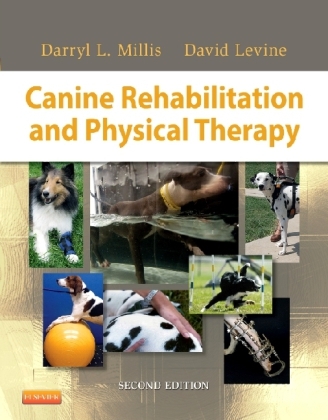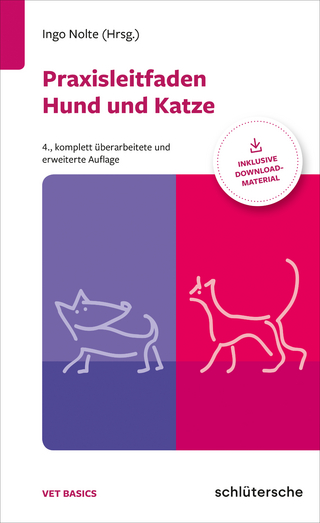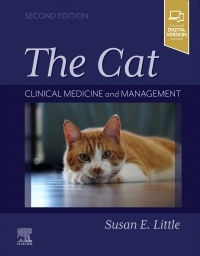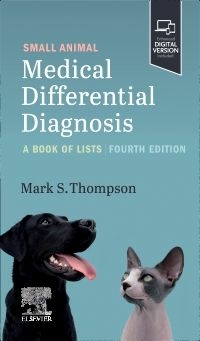
Canine Rehabilitation and Physical Therapy
W B Saunders Co Ltd (Verlag)
978-1-4377-0309-2 (ISBN)
Bridging the gap between human physical therapy and veterinary medicine, Canine Rehabilitation and Physical Therapy, 2nd Edition provides vets, veterinary students, and human physical therapists with traditional and alternative physical therapy methods to effectively evaluate and treat dogs with various debilitating conditions. Coverage includes treatment protocols for many types of cutaneous, neurologic, and musculoskeletal injuries to facilitate a faster and more complete recovery.
"Overall, this book is an extensive text for anyone interested in pursuing canine rehabilitation and physical therapy" Reviewed by: Helen Davies, University of Melbourne on behalf of Australian Veterinary Journal, March 2015
Invaluable protocols for conservative and postoperative treatment ensure the successful healing of dogs and their return to full mobility.
Printable medical record forms on the companion website, including client information worksheets, referral forms, orthopedic evaluation forms, and more, can be customized for your veterinary practice.
Six completely updated chapters on exercising dogs define the basic principles of aquatic and land-based exercise and how they may be applied to dogs, as well as how physical therapy professionals can adapt common "human" exercises to dogs.
Numerous chapters on therapeutic modalities, including therapeutic lasers, illustrate how physical therapy professionals can adapt common "human" modalities to dogs.
Physical examination chapters offer comprehensive information on orthopedics, neurology, and rehabilitation.
New chapters keep you up to date with coverage of joint mobilization, rehabilitation of the athletic patient, biomechanics of rehabilitation, and physical therapy for wound care.
A companion website includes 40 narrated video clips of various modalities and exercises used to correct problems with lameness, hip disorders, and gait analysis, plus downloadable and printable orthopedic, neurologic, and physical rehabilitation forms, in addition to a client information worksheet, referral form and letter, and a daily flowsheet form.
Dr. Millis received his BS and DVM from Cornell University, MS from the University of Florida, and completed an internship and surgery residency at Michigan State University. He is a Diplomate of the American College of Veterinary Surgeons, a founding charter Diplomate of the American College of Veterinary Sports Medicine and Rehabilitation, and is Professor of Orthopedic Surgery at the University of Tennessee College of Veterinary Medicine, where he served as chief of surgery. Dr. Millis is currently the Director of the CARES Center for Veterinary Sports Medicine and is a co-editor of the Textbook of Small Animal Physical Therapy and Rehabilitation;_Essential Facts of Physiotherapy in Dogs and Cats; Small Animal Physical Rehabilitation: Veterinary Clinics of North America-Small Animal Practice; and Multimodal Management of Canine Osteoarthritis. He is a primary faculty member of the University of Tennessee Certificate Program in Canine Rehabilitation, which received the Outstanding Non-Credit Program Award from the Association for Continuing Higher Education. This course is now taught in five continents: North America, South America, Europe, Asia, and Africa. He is also the Past President of the International Association of Veterinary Rehabilitation and Physical Therapy. His primary areas of research interests include osteoarthritis, physical rehabilitation, and modulation of fracture healing with growth factors. Dr. Millis has delivered over 900 presentations at state, national and international meetings, and has authored over 45 publications, 50 textbook chapters, and 100 abstracts/proceedings David Levine, Cline Chair of Excellence in Physical Therapy and Acting Department Head ,Department of Physical Therapy,The University of Tennessee at Chattanooga
Section I: Introduction to Physical Rehabilitation
History of Canine Physical Rehabilitation
Regulatory and Practice Issues for the Veterinary and Physical Therapy Professions
Conceptual Overview of Physical Therapy, Veterinary Medicine, and Canine Rehabilitation
Section II: Basic Science of Veterinary Rehabilitation
Canine Behavior
Canine Anatomy
Tissue Healing: Tendons, Ligaments, Bone, Muscles, and Cartilage
Responses of Musculoskeletal Tissues to Disuse and Remobilization
Exercise Physiology
Exercise Physiology of the Canine Athlete - NEW!
Section III: Patient Assessment and Management
Orthopedic and Neurologic Examination
Canine Locomotion Analysis
The Physical Rehabilitation Evaluation - NEW!
Assessing and Measuring Outcomes
Rehabilitating the Painful Patient: Pain Management in Physical Rehabilitation - NEW!
The Role of Chondroprotectants, Nutraceuticals, and Nutrition in Rehabilitation Nursing Care of the Rehabilitation Patient - NEW!
Nursing Care of the Rehabilitation Patient - NEW!
Devices for Ambulation Assistance in Companion Animals - NEW!
Section IV: Therapeutic Modalities
Superficial Thermal Modalities
Therapeutic Ultrasound
Electrical Stimulation - NEW!
Therapeutic Lasers in Canine Rehabilitation - NEW!
Applications of Extracorporeal Shock Wave in Small Animal Practice - NEW!
Other Modalities in Veterinary Rehabilitation - NEW!
Section V: Therapeutic Exercise and Manual Therapy
Biomechanics of Physical Rehabilitation and Kinematics of Exercise - NEW!
Range-of-Motion and Stretching Exercises
Joint Mobilization - NEW!
Massage
Exercises for Proprioception, Balance, and Joint Position Awareness
Therapeutic Exercises: Early Limb Use Exercises
Therapeutic Exercises: Joint Motion, Strengthening, Endurance and Speed Exercises
Aquatic Therapy
Section VI: Physical Therapy for Specific Diagnoses
Common Orthopedic Conditions and Their Physical Rehabilitation
Common Conditions and Physical Rehabilitation of the Athletic Patient - NEW!
Neurologic Conditions and Physical Rehabilitation of the Neurologic Patient
Physical Rehabilitation for Geriatric and Arthritic Patients
Physical Therapy for Wound Care - NEW!
Physical Rehabilitation for the Critically Injured Veterinary Patient
Development of a Rehabilitation Facility for Small Animals and Business Considerations
Appendix 1: Protocol Development and Protocols
Appendix 2: Manufacturers of Supplies and Equipment - NEW!
Glossary
Index
| Erscheint lt. Verlag | 24.10.2013 |
|---|---|
| Verlagsort | London |
| Sprache | englisch |
| Maße | 216 x 276 mm |
| Gewicht | 2360 g |
| Themenwelt | Veterinärmedizin ► Kleintier |
| ISBN-10 | 1-4377-0309-7 / 1437703097 |
| ISBN-13 | 978-1-4377-0309-2 / 9781437703092 |
| Zustand | Neuware |
| Informationen gemäß Produktsicherheitsverordnung (GPSR) | |
| Haben Sie eine Frage zum Produkt? |
aus dem Bereich


